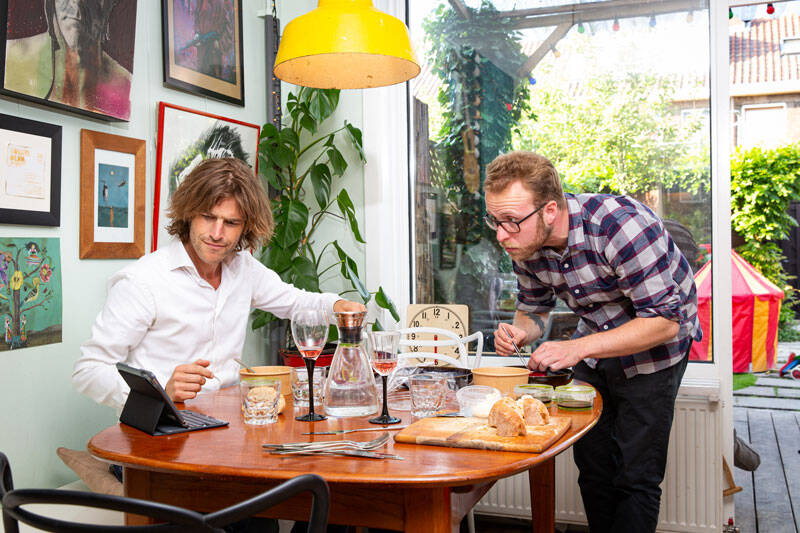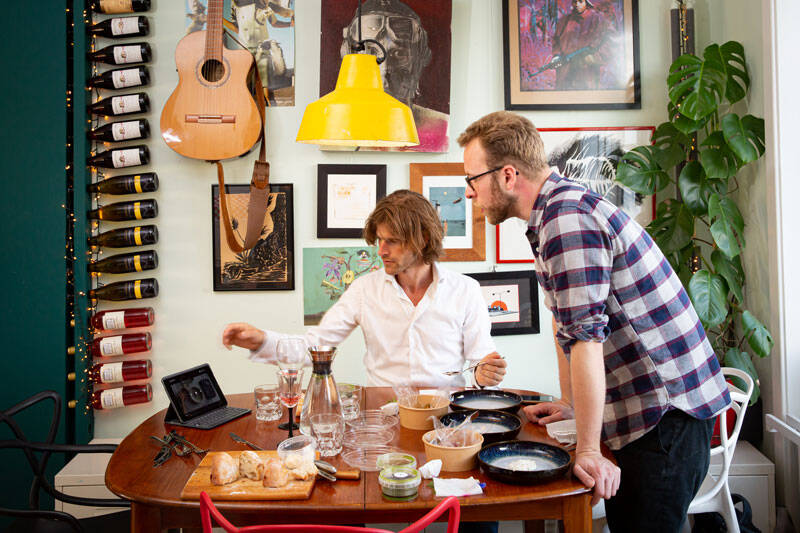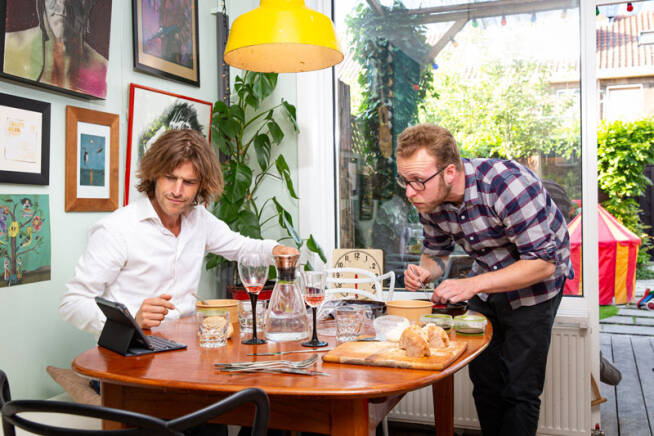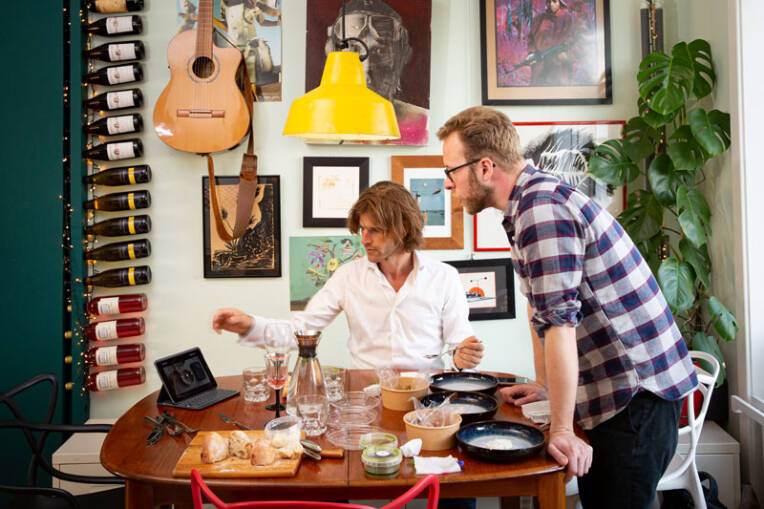
The strain on our friendships caused by COVID-19

Catching up in different ways
It’s clear that not being able to eat with friends can be alienating. Cooking and having dinner together acts as a unifier, a place of community. Sharing a meal is a way to catch up and talk, and is one of the few moments where people are happy to put aside their work and take time out of their day. A way to make sure certain friendships don’t dilute too much is by blocking time in your calendar to make a regular phone call. In the article in the New York Times they call this ‘check-ins as if they were a work meeting’. For friends you don't talk to on a daily basis, a planned moment can be ideal to ask how the other person is doing and to hear each other's anecdotes. We put together some examples of initiatives that have offered more of an experience than just a phone call, and enable friends to connect and enjoy food together in a safe way:
The Dutch tech company Ex Machina Group (EMG) has been developing websites and apps for years. During the pandemic, they came up with a solution to connect people: The Tasting Games. The online games are a combination of live quizzes and food and wine tastings. The tastings can be booked individually or as a group. After the food tasting of choice is selected, participants receive a box with products at their home. During a live session, a connoisseur will guide the participants through the quiz, after which a winner is announced.
As people adjust to a new way of life, with social distancing making it difficult for people to connect, beer company Desperados and international festival organization Elrow have come together to ignite the party spirit virtually, for consumers around the world, by hosting livestreams with DJ’s playing different sets. The beer company isn’t the only player in this field. Worldwide festival organisations and music lovers are organizing the same sort of events where friends, acquaintances and strangers can come together virtually and enjoy their drinks and music together online.
During the first months of lockdown that started in March, the Canadian Winnipeg’s West End Business Improvement Zone (BIZ) prepared online dinner parties featuring food made by local restaurants and producers. BIZ also provided a game of trivia and some special guest appearances, all hosted by one of its tour guides.
The Dinner Party Collective is an initiative to help students reclaim their relationship with food. Since then, it has expanded into an organization that helps connect students, local community members, organizations, and independent producers. However, since the beginning of 2020, they have had to postpone all public gatherings in an effort to reduce the spread of COVID-19. Despite the changes brought on by social distancing and self-isolation, the initiative continues to bring people together over food through the internet. To join, people just have to sign up for their mailing list and will receive a Zoom conference link to join the weekly online communal meals, cooked individually but consumed together.
Different views during COVID-19
But it’s not just the absence of regular physical contact that is putting a strain on our friendships. It’s also the common vision on life that can be disturbed by the effects of the pandemic. For example, a friend suddenly turns out to be much more scared and worries about the situation going on in the world than you do. Or the other way around where a friend doesn't mind hugging you, where you may find this out of line and dangerous. Issues like these could normally be discussed over a meal together as Alice P. Julie argues issues on boundaries of intimacy or distance can be set around the dinner table.
Hard times to make new friends
Although these times are difficult for all friendships, especially young people, whose social life often consists of spontaneous plans, are suffering. In addition, certain people that are in a transition phase and are therefore less able to rely on old contacts, are having difficulty creating and maintaining social contacts. For example first-year students can’t easily make friends among other students, during their weekly Zoom lecture, when communal lunch breaks or coffee-talk are moments where connection starts. The same applies to people who have just gotten a new job and hardly see their colleagues in real life. As a result of not being able to maintain friendships, people are taking all kinds of measures to feed their social needs. For example Dutch student associations have seen a big increase in their applications, even getting together in groups of more than a couple is still prohibited. It shows that the need for social contact lies in the core of human nature.
C-list friends are fading away
Like many things we used to consider as normal parts of our lives, our friendships are on the back burner. Writer and ‘connection coach’ Kat Vellos states in an article in the New York Times that there are four basic ingredients for a good friendship: physical proximity, regular interactions, a well-distributed investment in each other and a common vision on life. In the book, We Should Get Together: The Secret to Cultivating Better Friendships, she calls these factors ‘seeds of connection’. When these elements are all present, a healthy friendship can bloom. However, if any of these components are lacking "due to circumstance or not being actively nurtured, the greater your likelihood of failure", she writes.
Defining relationships through food
In her book Eating Together: Food, Friendship, and Inequality, sociologist Alice P. Julier argues that the ways in which Americans eat together play a central role in social life in the United States. She finds that when people invite friends, neighbors, or family members to share meals within their households, social inequalities involving race, economics, and gender reveal themselves in interesting ways: relationships are defined, boundaries of intimacy or distance are set, and people find themselves either excluded or included. While we are not eating together with friends and other relationships, our connection to each other and our ability to feel empathy also isn’t being fed.
Lisa Appels Sander van der Meij
Sharing and enjoying food together is a basic human expression of friendship, pleasure, and community. But during the pandemic it’s obvious that a vibrant social life isn't as easy as it was before. Dinner parties, drinks with friends and spontaneous plans, can’t be part of life in times of social distancing and abiding to the advice to limit physical contact. During the pandemic, it’s important to consider what these times, and the abstinence of eating and drinking together does to our friendships.
trendwatch
5 min
WHAT HAPPENS WHEN WE DON'T EAT MEALS TOGETHER?









Catching up in different ways
It’s clear that not being able to eat with friends can be alienating. Cooking and having dinner together acts as a unifier, a place of community. Sharing a meal is a way to catch up and talk, and is one of the few moments where people are happy to put aside their work and take time out of their day. A way to make sure certain friendships don’t dilute too much is by blocking time in your calendar to make a regular phone call. In the article in the New York Times they call this ‘check-ins as if they were a work meeting’. For friends you don't talk to on a daily basis, a planned moment can be ideal to ask how the other person is doing and to hear each other's anecdotes. We put together some examples of initiatives that have offered more of an experience than just a phone call, and enable friends to connect and enjoy food together in a safe way:
The Dutch tech company Ex Machina Group (EMG) has been developing websites and apps for years. During the pandemic, they came up with a solution to connect people: The Tasting Games. The online games are a combination of live quizzes and food and wine tastings. The tastings can be booked individually or as a group. After the food tasting of choice is selected, participants receive a box with products at their home. During a live session, a connoisseur will guide the participants through the quiz, after which a winner is announced.
As people adjust to a new way of life, with social distancing making it difficult for people to connect, beer company Desperados and international festival organization Elrow have come together to ignite the party spirit virtually, for consumers around the world, by hosting livestreams with DJ’s playing different sets. The beer company isn’t the only player in this field. Worldwide festival organisations and music lovers are organizing the same sort of events where friends, acquaintances and strangers can come together virtually and enjoy their drinks and music together online.
During the first months of lockdown that started in March, the Canadian Winnipeg’s West End Business Improvement Zone (BIZ) prepared online dinner parties featuring food made by local restaurants and producers. BIZ also provided a game of trivia and some special guest appearances, all hosted by one of its tour guides.
The Dinner Party Collective is an initiative to help students reclaim their relationship with food. Since then, it has expanded into an organization that helps connect students, local community members, organizations, and independent producers. However, since the beginning of 2020, they have had to postpone all public gatherings in an effort to reduce the spread of COVID-19. Despite the changes brought on by social distancing and self-isolation, the initiative continues to bring people together over food through the internet. To join, people just have to sign up for their mailing list and will receive a Zoom conference link to join the weekly online communal meals, cooked individually but consumed together.

Different views during COVID-19
But it’s not just the absence of regular physical contact that is putting a strain on our friendships. It’s also the common vision on life that can be disturbed by the effects of the pandemic. For example, a friend suddenly turns out to be much more scared and worries about the situation going on in the world than you do. Or the other way around where a friend doesn't mind hugging you, where you may find this out of line and dangerous. Issues like these could normally be discussed over a meal together as Alice P. Julie argues issues on boundaries of intimacy or distance can be set around the dinner table.
Hard times to make new friends
Although these times are difficult for all friendships, especially young people, whose social life often consists of spontaneous plans, are suffering. In addition, certain people that are in a transition phase and are therefore less able to rely on old contacts, are having difficulty creating and maintaining social contacts. For example first-year students can’t easily make friends among other students, during their weekly Zoom lecture, when communal lunch breaks or coffee-talk are moments where connection starts. The same applies to people who have just gotten a new job and hardly see their colleagues in real life. As a result of not being able to maintain friendships, people are taking all kinds of measures to feed their social needs. For example Dutch student associations have seen a big increase in their applications, even getting together in groups of more than a couple is still prohibited. It shows that the need for social contact lies in the core of human nature.
C-list friends are fading away
Like many things we used to consider as normal parts of our lives, our friendships are on the back burner. Writer and ‘connection coach’ Kat Vellos states in an article in the New York Times that there are four basic ingredients for a good friendship: physical proximity, regular interactions, a well-distributed investment in each other and a common vision on life. In the book, We Should Get Together: The Secret to Cultivating Better Friendships, she calls these factors ‘seeds of connection’. When these elements are all present, a healthy friendship can bloom. However, if any of these components are lacking "due to circumstance or not being actively nurtured, the greater your likelihood of failure", she writes.
Defining relationships through food
In her book Eating Together: Food, Friendship, and Inequality, sociologist Alice P. Julier argues that the ways in which Americans eat together play a central role in social life in the United States. She finds that when people invite friends, neighbors, or family members to share meals within their households, social inequalities involving race, economics, and gender reveal themselves in interesting ways: relationships are defined, boundaries of intimacy or distance are set, and people find themselves either excluded or included. While we are not eating together with friends and other relationships, our connection to each other and our ability to feel empathy also isn’t being fed.
Lisa Appels Sander van der Meij
Sharing and enjoying food together is a basic human expression of friendship, pleasure, and community. But during the pandemic it’s obvious that a vibrant social life isn't as easy as it was before. Dinner parties, drinks with friends and spontaneous plans, can’t be part of life in times of social distancing and abiding to the advice to limit physical contact. During the pandemic, it’s important to consider what these times, and the abstinence of eating and drinking together does to our friendships.
The strain on our friendships caused by COVID-19

5 min
















